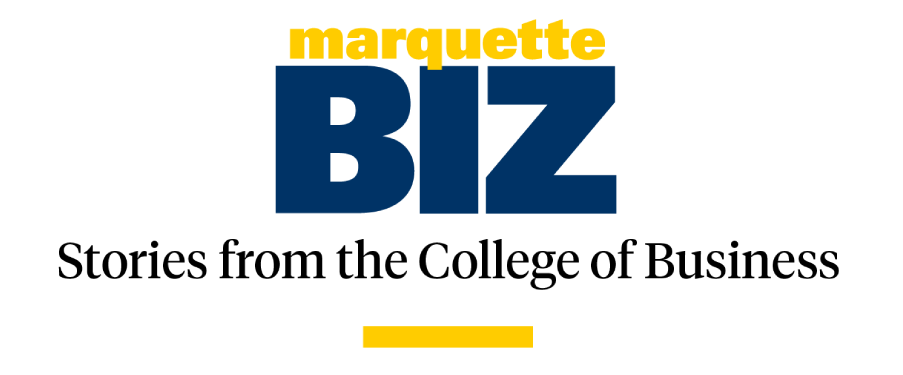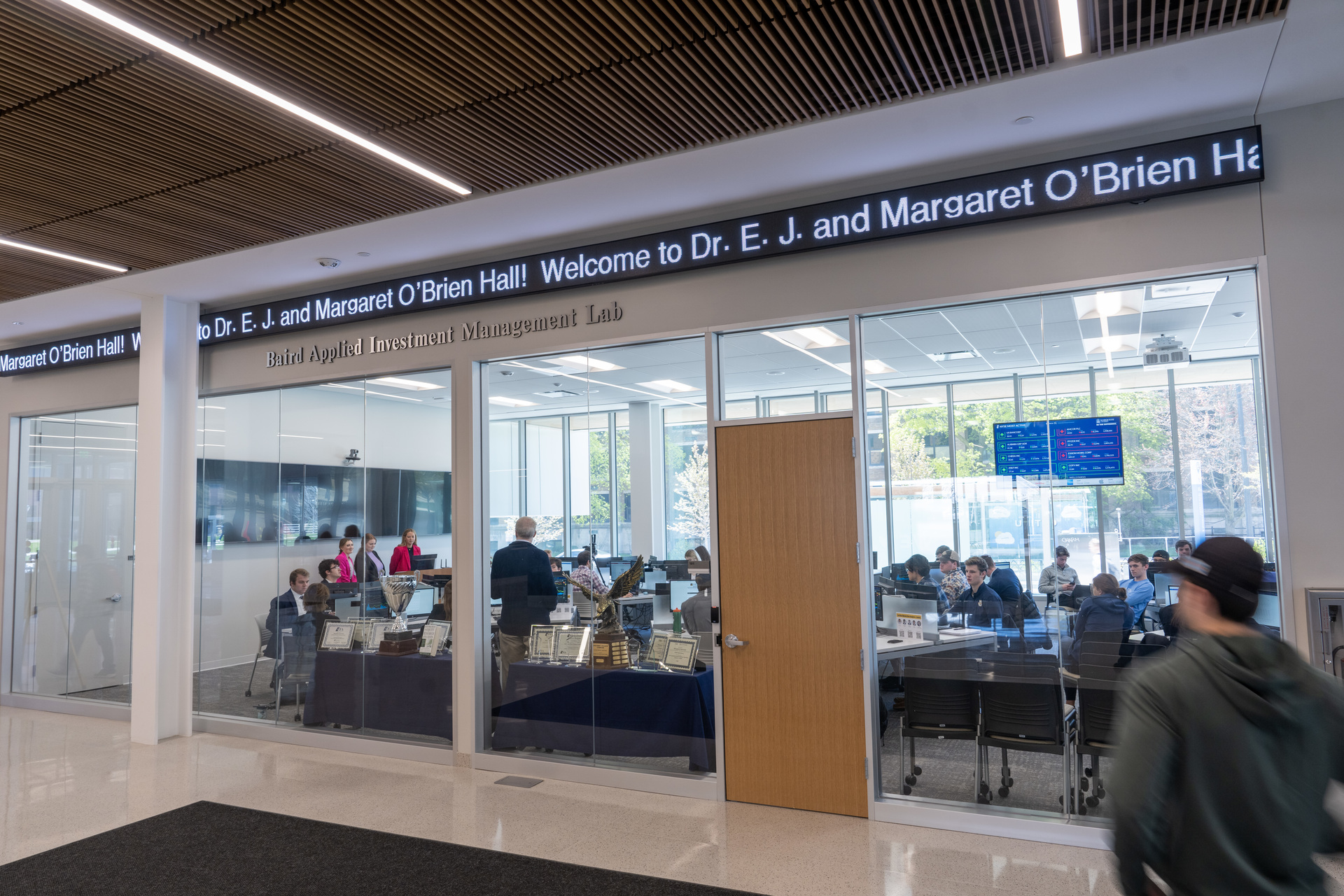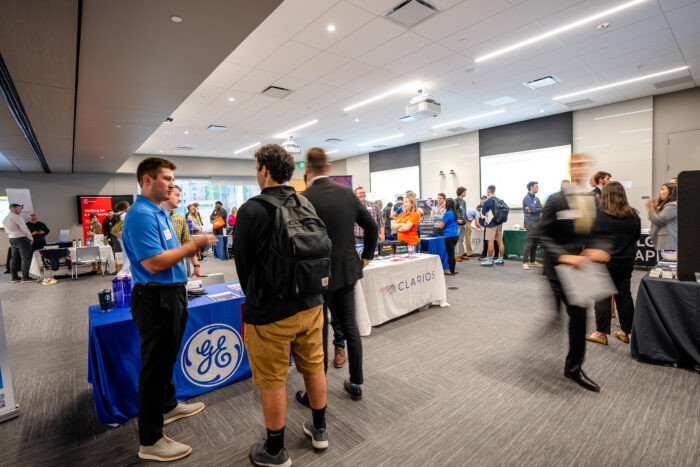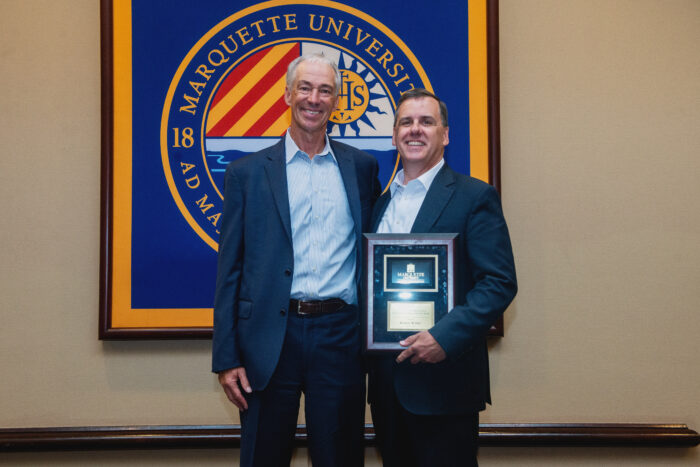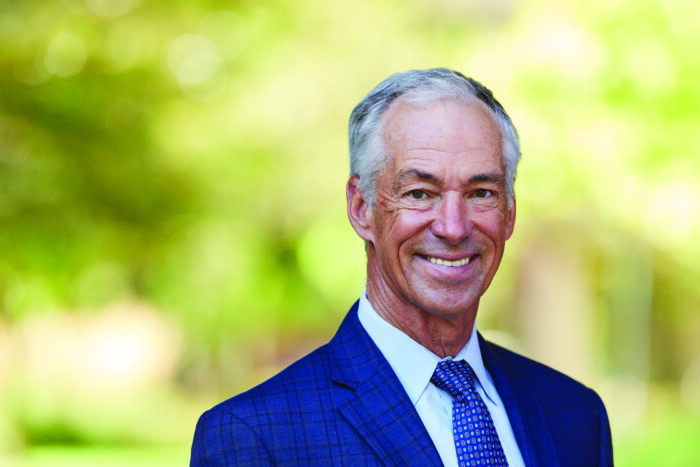Rising Marquette senior Grant Winkel looked out the window of his New York City internship office and saw the Morgan Stanley headquarters front and center. The summer analyst at J.P. Morgan quickly realized he was looking at the former workplace of his finance professor, Dr. Jim Valentine.
“I logged many hours at work with my team this summer at J.P. Morgan where I was fortunate to land an internship. Seeing Morgan Stanley’s building was a reminder of how well-prepared I was to meet the challenging experience, thanks to my professors’ instruction,” Winkel recalls.
Winkel is a part of the AIM Program, one of the College of Business Administration’s marquee programs, known nationally as a gold standard in undergraduate investment management education. Founded in 2004 by former director Dr. David Krause to turn high performing finance students into the next generation of industry leaders, the former “Applied Investment Management” program has produced hundreds of analysts, portfolio managers, traders and directors that hold influential positions on Wall Street and beyond.
Newly retitled as “Accelerating Ingenuity in Markets” to better reflect the program’s evolving focus on financial technology and emerging markets, was recently named its own major separate from the college’s finance major, a move that underscores the program’s continued success.
AIM is led by Dr. Joe Wall, executive director, an accomplished institutional investor. He sees AIM’s core value as more holistic than simply learning how to invest.
“We produce ethical leaders who are able to identify disruptive ideas, put a financial value on them, and pitch them in both written and verbal form,” Wall says. “That’s such an important skill regardless of who you are and your chosen career path.”
“The entire job market is about to change, and I truly believe Marquette is on the leading edge of that change.”
Dr. Joe Wall, Executive Director of Accelerating Ingenuity in Markets
Reflecting its evolution as a business major, AIM offers a financial technology, or fintech, concentration alongside its classic Chartered Financial Analyst (CFA) track. Fintech students earn professional certifications that verify they are capable of finding, valuing and applying disruptive technologies in the financial services sector, in much the same way that CFA students make significant progress toward becoming Chartered Financial Analysts.
“We often develop an easier way of executing the things that people in the CFA track do,” says Annie Stone, a rising junior in AIM’s fintech concentration. “CFAs will depend on financial technology software when they’re working on their stock pitches and valuations. We make it easier for people to execute financial transactions.”
While both tracks teach some of the same fundamentals, students in each have the opportunity to customize their learning outcomes to best prepare for future jobs. CFA students help manage part of the university’s endowment under Valentine’s watchful eye. He serves as the program’s director and was one of the country’s top ranked sell-side analysts during his time on Wall Street.
Students learn the nuts and bolts of researching, analyzing and valuing a stock using industry-standard applications, a process that culminates in weekly pitch meetings and stock trades for the university’s investment portfolio.
“I’ve talked to a number of our student interns this summer who feel that they stand out among their peers because they have all these advanced skills they’ve learned,” Valentine says. “I heard one employer say that he likes Marquette interns because they train all the other interns.”
“I entered this critical summer internship following my junior year so well prepared,” Winkel says. “That includes having a high comfort level interacting with top leadership. AIM students right away gain knowledge and valuable professional skills that allow us to engage in productive and informed conversations with finance veterans.”
Fintech students benefit from the same professional development while also focusing on different technical skills. Wall points out that students master how to write Python code and perform in-depth data science procedures. They also become skilled in finding and valuing technologies that are not necessarily part of Fortune 500 companies.
“The fintech major is designed to capitalize on what jobs will look like in the next five to 10 years,” Wall says. “The entire job market is about to change, and I truly believe Marquette is on the leading edge of that change.”
As part of his mission to develop ethical leaders, Wall also has long envisioned an elevated service component to AIM, which is now a codified requirement. To pass AIM’s final one-credit course, all students must complete at least 10 hours of community service every semester. Wall and Valentine hope that AIM students eventually will contribute 1,500 or more community service hours each year.
“I came to Marquette because I wanted to Be The Difference, and meaningful service is the best way to put the ethical part of our program into practice,” Wall says.
Wall and Valentine each have doctorate degrees and nearly 40 years of combined experience on Wall Street, an exceedingly rare combination in academia. The two professors form a leadership team with credentials that match or exceed those of any other peer program in the country.

Reminiscent of his days on Wall Street, Valentine often arrives in O’Brien Hall before the sun rises, while Wall will linger in the program’s laboratory sometimes well past dark. Most of that time is spent with students — solving problems, answering questions, mentoring — because AIM’s focus on student success doesn’t stop at 5 p.m.
“Dr. V and Dr. Wall are two of the most inspiring and motivational professionals I’ve ever worked with,” Winkel says. “Their experience in the industry is second to none and they bring that to the program every day. They preach continuous learning that stretches your abilities, and they both walk their talk.”
“I’ve worked a lot with Joe Wall and he really is there for the success of his students,” Stone adds. “He teaches in a way that’s hands-on and personalized to each one of us and I really appreciate that.”
Students interact with their instructors daily in the Baird AIM Lab, the program’s new home in O’Brien Hall. The glass-enclosed space on the building’s first floor has a view of 16th Street and Wisconsin Avenue and often is the first thing prospective business students see when they enter the building on tour. Last winter break, a team of four AIM students working on a global case competition were the first to experience O’Brien Hall, coming into the lab roughly a week before their peers started 2023 spring semester classes.
The new design, complete with the latest technology, was a welcome improvement over AIM’s original space on the fourth floor of Straz Hall. Students now have 24/7 access to the lab and regularly come in to collaborate on projects or even just watch a Marquette basketball game or play chess.
“By having the lab in a high-profile area in a phenomenal facility, it attracts more students to want to be engaged,” Valentine says. “The change has raised AIM’s profile in the college and to some extent, across the entire university.”
Though the program is ever evolving, AIM’s most impactful traditions continue, such as the annual trip to New York City. Over fall break, the trip exposes students to the world’s financial capital and helps to form connections with hiring managers at leading investment banks, hedge funds and other financial services firms, many of whom are Marquette — and AIM — alumni.
As AIM alumni progress further in the financial world, each year’s trip offers more robust exposure to leading global firms and top executives. In the nearly 20 years that AIM has been around, numerous people who started their careers in the original Straz Hall laboratory have gone from summer intern analysts to managing directors.
“Our alumni pave the ground we walk on,” Wall says. “We had a phenomenal New York trip last year because our alumni stepped up in profound and generous ways. We anticipate this year’s trip will be even better in terms of the number of meaningful interactions our students have. AIM wouldn’t be what it is without our alumni. They constantly open doors for us.”
The fall 2023 semester will see the Baird Lab doors open to the first group of students to begin as official AIM majors. After plenty of stock pitches, late nights and text exchanges with professors, they will graduate and make their mark on the future of finance, just as those before them did.
